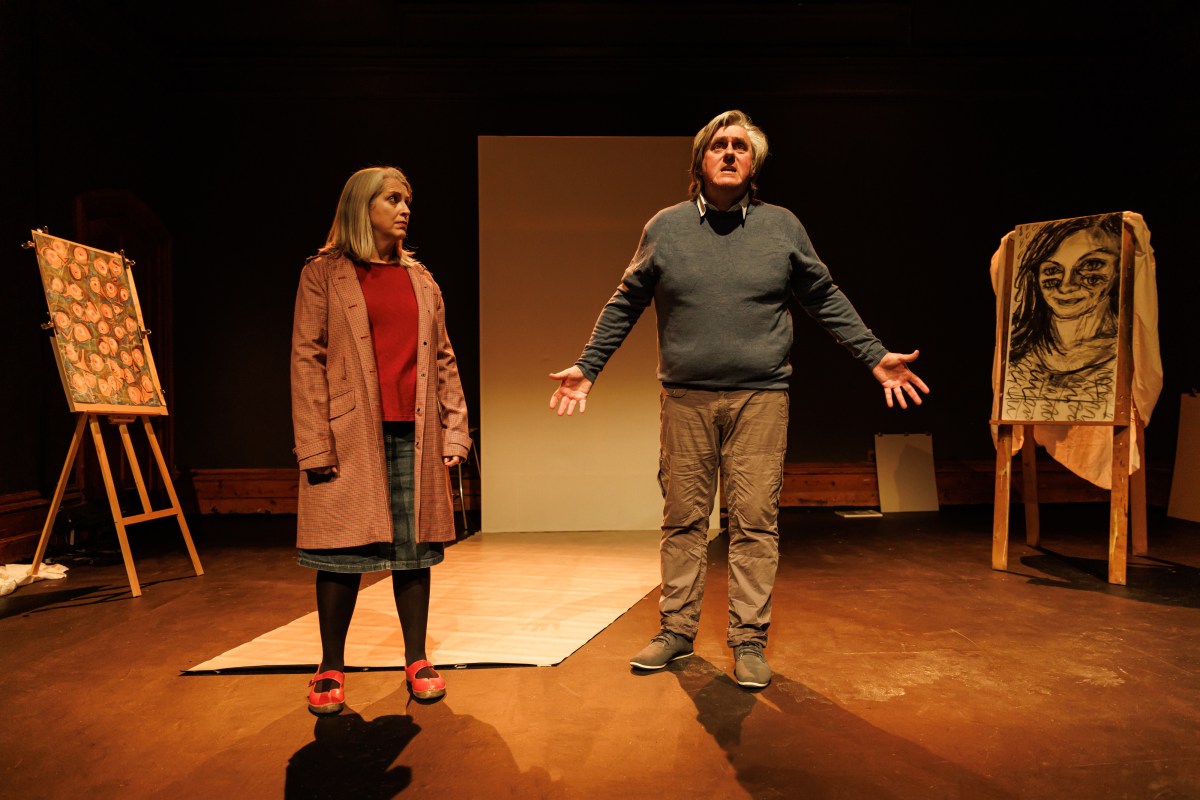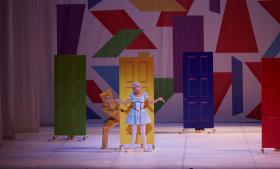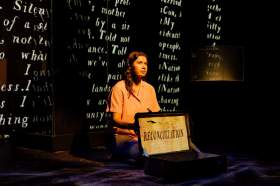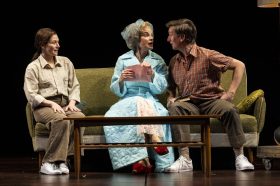Little Brother, Big Sister is a two-hander about a man diagnosed with schizophrenia and his sister, who becomes his carer after their parents’ deaths. Performed at La Mama Courthouse, Little Brother, Big Sister was written by Michel Paul Tuomy, a writer who has lived experience of schizophrenia.
It’s an important story to be told, by someone with the experience to tell it, but this production – despite some lovely performances by the two actors – was ultimately unsatisfying as a piece of theatre.
The story begins during the siblings’ young adulthood, with Michel, an aspiring writer obsessed with the writing of Franz Kafka (particularly his Metamorphosis), studying at TAFE. His elder sister, Karen, has completed a fine arts degree and dreams of becoming a painter like her idol, the Spanish surrealist Joan Miró.
Michel’s post-study years lead him to a life as a masseur living in a share house in Byron Bay, where he suffers his first mental health breakdown: paranoid delusions that result in him winding up in a mental health hospital.
Karen is called back from her bohemian dreams to be there for her brother. She leaves behind a love interest, Gabriel, the first of only a few very allusions to what Karen’s life without her brother, and without her new role as carer (the focus of the play), may have entailed.
While dealing with some fascinating and important topics – what it’s like to suffer from schizophrenia, and the impact it has on a family – the play’s reliance on long-winded exposition told by the main characters through monologues directed at the audience, and often letter-reading, slowed the action and inhibited the play from finding a more satisfying dramatic structure.
The actors (Adam Cass as the childlike Michel and Myf Powell as his carer/sister Karen) did what they could to bring to life the relatively thin characterisation explored through the dramatic action of the play. This was particularly true for Powell, who – as Karen – seemed reduced to an always affable, kindly and caring prop character, circling her brother’s mental illness and providing support.
The play shone in some of the touching scenes between brother and sister – particularly in the latter parts. In the lighting up of her whole person at the thought of a four-week holiday to Europe by herself, we saw the sacrifices Karen had made and her brother’s willingness to make changes to ensure her happiness. We also saw some true, real and fun brother-sister moments – as they chatted and ate Cheezels on their fingers, discussing meds and Michel’s voices.
This play would be strengthened by a focus on showing rather than telling, a narrowing in on the action of the play to capitalise on some of the more interesting parts of the story, and a clearer sense of time and delineation of place. I wasn’t sure how many years had passed at the end of the play and why Gabriel seemed to still be a love prospect for Karen, after she had left him in what seemed like her early 20s.
The stripped-back set used the existing doors of the theatre as entry and exit points for the actors, and the most striking feature was a white painted wall and partially-painted floor. I thought initially that it represented a light shining through a window, but it wasn’t that clear. It served throughout the play as both projection screen for Michel and Karen’s artworks and seemingly as a reference point for ‘the hospital’. Being so prominent in the space, this white wall and floor were often between Karen and Michel’s frequent across stage conversations – with Michel at one point jumping across the area – and it was never clear where we were.
Towards the end of the play in a moment of meta playwriting, Michel (also the playwright’s name) told Karen he was writing a play, and he asked her what she as a carer would want people to know about what it’s like being a carer, and she – complying – turned to the audience and told us.
Read: Book review: The Terrible Event, David Cohen
The ending felt didactic: as if it was trying to wrap up the story in a neat bow and teach us some lessons. And it’s true, we do need these lessons. We certainly need more stories from the perspective of those with lived experience of mental illness but, in the theatre, this must be with the tools of drama rather than education.
Little Brother, Big Sister by Michel Paul Tuomy
La Mama Courthouse
Director: Cathy Hunt
Dramaturg: Peter Matheson
NDIS Arts Mentor: Tania Smith
Mad Comrade: Sandy Jeffs
Set and Costume Design: Kris Bird
Sound Design and Composition: Jess Keeffe
Lighting Design (original): Shane Grant
Lighting Realisation and Recreation: Giovanna Yate Gonzalez
LX, SFX & A/V Operator: Katie Williams
Michel’s artworks: Michel Paul Tuomy
Karen’s artworks: Elyss McCleary
Cast: Adam Cass and Myf Powell
Little Brother, Big Sister was performed 7-18 June 2023.





